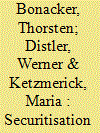|
|
|
Sort Order |
|
|
|
Items / Page
|
|
|
|
|
|
|
| Srl | Item |
| 1 |
ID:
130165


|
|
|
|
|
| Publication |
2014.
|
| Summary/Abstract |
Gandhi was a strong critique of modernity. In his scheme of economy, production and technology there is room for machine but that would not replace human labour and concentration of power in the hands of few. He gave primary importance to simple technology over heavy industries. Simple technology can create mass employment, whereas advanced technology can lead to vast unemployment in a country like India. Thus, he preferred production by masses over mass production by heavy machinery. He wanted that appropriate technology and ideology should go together with culture of self-control. He believed in eco-humanism and integral development of men and a decentralized socio-economic, political order at the grassroots under people's direct control. He strived for an alternative practice, which was trusteeship and that was distinctly local or relevant to specific contexts. Trusteeship alone could bring about the regeneration of India society.
|
|
|
|
|
|
|
|
|
|
|
|
|
|
|
|
| 2 |
ID:
163325


|
|
|
|
|
| Summary/Abstract |
The United Nations has engaged in (neo)trusteeship statebuilding in two different contexts: post-Second World War decolonisation and after the Cold War. On both occasions, statebuilding aimed at preventing organised, large-scale violence. Nevertheless, these statebuilding efforts were confronted by several forms of violence, ranging from civil war to a high level of politically motivated violence. In this article, we ask how and why administrations in French Cameroon, New Guinea, Kosovo and Timor-Leste implementing (de)securitised such violence – by addressing it as a serious threat and imple-menting policies of protection, by portraying it as something manageable or even by ignoring it.
|
|
|
|
|
|
|
|
|
|
|
|
|
|
|
|
| 3 |
ID:
117725


|
|
|
|
|
| Publication |
2012.
|
| Summary/Abstract |
International trusteeship of post-conflict territories by multilateral institutions or foreign states received renewed attention in the wake of its application in Kosovo and East Timor during the 1990s. Subsequently, interventions in Afghanistan and Iraq have contributed to the intensity of critical discussion over post-Westphalian sovereignty approaches and competing norms regarding human rights, nationalism, and security. This article seeks to establish normative and practical criteria for the application of the trusteeship model to weak, fragile, or post-conflict societies. In particular, I propose that consent of the local population, multilateral international approval and participation, and absence of local institutional capacity for effective governance form the key dimensions of the legitimacy and feasibility of a potential international trusteeship. Building on the literatures on quasi-states, state building, liberal institutionalism, and critiques of international intervention, the article tests the utility of these criteria through illustrations of international trusteeships in East Timor, Kosovo, and through a more extensive analysis of the Palestinian territories. It concludes that, despite frustrations over the Israel-Palestinian peace process in the absence of intensive external intervention, the Palestinian territories do not meet the proposed criteria for the effective and legitimate application of an international trusteeship.
|
|
|
|
|
|
|
|
|
|
|
|
|
|
|
|
|
|
|
|
|